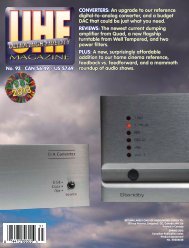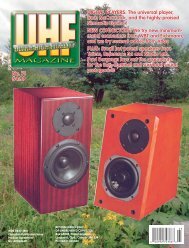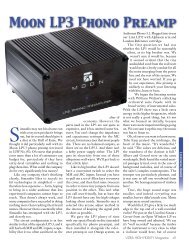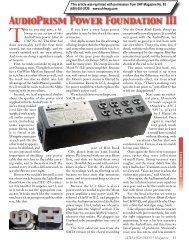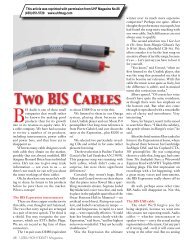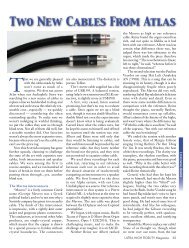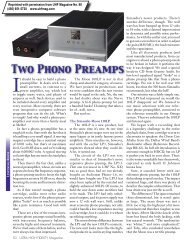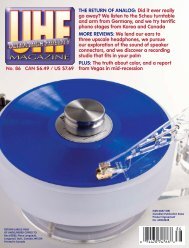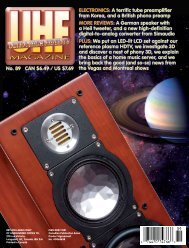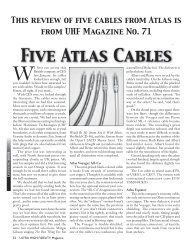download the PDF version - Ultra High Fidelity Magazine
download the PDF version - Ultra High Fidelity Magazine
download the PDF version - Ultra High Fidelity Magazine
You also want an ePaper? Increase the reach of your titles
YUMPU automatically turns print PDFs into web optimized ePapers that Google loves.
Rendezvous<br />
UHF: You mean, not while CES is<br />
on?<br />
Gornik: Yes. They should come<br />
next week, after we close. It seems<br />
unfair to me that <strong>the</strong>y take advantage<br />
of this big effort that we all<br />
invest in to make CES very exciting<br />
and productive.<br />
UHF: That leads to a natural question.<br />
Has <strong>the</strong>re been any discussion with<br />
<strong>the</strong> organizers of T.H.E. Expo about a<br />
possible agreement?<br />
Gornik: We have met with <strong>the</strong>m<br />
on a number of occasions, very productively<br />
I had thought, but <strong>the</strong>re<br />
doesn’t seem to be any grounds<br />
for agreement. We’ve really tried.<br />
We’ve extended a diplomatic hand<br />
to <strong>the</strong>m, because we would like to<br />
see this community under one roof.<br />
We think it would benefit all of us.<br />
UHF: Everyone is surely aware that <strong>the</strong><br />
electronics industry, including high end<br />
audio, is very masculine-oriented — which<br />
is a shame, because music inherently is not.<br />
Can we say that it is a particular coup to<br />
have a woman chairing <strong>the</strong> CEA board for<br />
<strong>the</strong> first time?<br />
Gornik: I think it’s a terrific thing to<br />
have a woman, finally, at <strong>the</strong> head of<br />
CEA. It is a male-dominated industry,<br />
but <strong>the</strong>re are opportunities we’re missing<br />
by not appealing to <strong>the</strong> woman buyer. In<br />
fact, CEA recently did market research<br />
which shows that women are responsible<br />
for <strong>the</strong> majority of consumer electronics<br />
purchases. And certainly <strong>the</strong>y are hugely<br />
influential. To ignore women is to ignore<br />
a huge opportunity for additional sales.<br />
And that’s not to mention <strong>the</strong> contribution<br />
we can make to <strong>the</strong>ir lives by<br />
bringing our products to <strong>the</strong>m. The<br />
adage says that diamonds are a girl’s<br />
best friend. Well, our market research<br />
indicates that this is no longer true<br />
UHF: Diamonds are dead?<br />
Gornik: When our researchers asked,<br />
“Would you prefer a diamond ring or a<br />
high-definition television?” 42% chose<br />
<strong>the</strong> ring, and 58% said <strong>the</strong>y would ra<strong>the</strong>r<br />
have <strong>the</strong> TV. I think retailers ought to<br />
listen up, here, and figure out <strong>the</strong> possibilities<br />
<strong>the</strong>y’re missing by <strong>the</strong> way <strong>the</strong>y<br />
approach women on <strong>the</strong> sales floor.<br />
UHF: So how does CEA do its part?<br />
Gornik: In fact we’re beginning to do<br />
that. We have a new media relations<br />
20 ULTRA HIGH FIDELITY <strong>Magazine</strong><br />
campaign called Technology is a girl’s best<br />
friend. At CES 2003 we had a panel discussion,<br />
and invited <strong>the</strong> editor of Cosmo<br />
Girl, and a woman from <strong>the</strong> Ogilvy ad<br />
agency, and also a woman responsible<br />
for store layout at Circuit City. And of<br />
course myself, and Karen Chupka, who<br />
is vice-president of CES. We had a very<br />
interesting, well-attended discussion<br />
on how we can talk to women more<br />
effectively.<br />
UHF: The o<strong>the</strong>r unusual element is<br />
that your company is relatively small —<br />
your predecessor came from Pioneer. That’s<br />
ano<strong>the</strong>r coup.<br />
Gornik: I think it’s terrific to put a face<br />
on small business. Did you know that<br />
77% of CEA’s members have less than<br />
$10 million gross revenues each year? So<br />
I think it’s great to have a person those<br />
small companies can relate to. One of <strong>the</strong><br />
initiatives our board recently approved,<br />
a suggestion of mine, is to put toge<strong>the</strong>r<br />
a small business council. Part of its<br />
mission is to be an incubator for small<br />
businesses, to help <strong>the</strong>m with licensing,<br />
copyright, channel development<br />
for instance. Even with existing businesses,<br />
<strong>the</strong>re is a host of services we can<br />
provide: developing good accounting,<br />
solving human resource problems and<br />
manufacturing problems — whatever<br />
<strong>the</strong>se small companies might need.<br />
UHF: We’d like to touch upon <strong>the</strong> subject<br />
of intellectual property. The content<br />
providers — film studios and record companies<br />
— are solidly against <strong>the</strong> initiatives<br />
of <strong>the</strong> hardware manufacturers,<br />
because <strong>the</strong>y believe new hardware are<br />
designed to help consumers steal <strong>the</strong>ir<br />
property. But your members include<br />
both content providers and hardware<br />
manufacturers. That must cause quite<br />
a debate within CEA.<br />
Gornik: That would be an understatement!<br />
UHF: Can you get away with saying<br />
more than that?<br />
Gornik: Well, it is difficult,<br />
because we want to have successful<br />
resolution of <strong>the</strong>se issues. It’s an<br />
ongoing process, it’s very difficult,<br />
and we’re throwing everything<br />
we’ve got at it to see if we can<br />
make it work.<br />
UHF: You were on <strong>the</strong> board of<br />
directors back when <strong>the</strong>re was also a<br />
Summer CES, <strong>the</strong> one in Chicago. People<br />
still talk about why that was no longer possible.<br />
It is of course easy to say, “exhibitors<br />
stopped coming.” But what made it impossible<br />
to have two shows?<br />
Gornik: Attendance had dropped, and<br />
<strong>the</strong> big box retailers needed to have<br />
a product introduction cycle that no<br />
longer fit <strong>the</strong> summer show. We may<br />
be seeing that change again, because<br />
product introductions have increased<br />
in frequency once again. I hear talk<br />
about introducing a summer show once<br />
again.<br />
UHF: But CEDIA (<strong>the</strong> Custom Electronic<br />
Design and Installation Association ) is here<br />
now, in early September.<br />
Gornik: CEDIA is here, but it addresses<br />
a narrower range of our industry than<br />
CES does. I believe that CES will<br />
continue to fulfill <strong>the</strong> industry’s needs,<br />
based on <strong>the</strong> scope it represents, and <strong>the</strong><br />
issue of a summer show continues to rear<br />
its head.<br />
UHF: There have been several initiatives<br />
by CEA to have international CES shows,<br />
but with uncertain success. Did <strong>the</strong>y come<br />
too soon?<br />
Gornik: Shows in o<strong>the</strong>r countries? In<br />
fact we have an initiative going in Shanghai.<br />
We are partnering with CEBit (<strong>the</strong><br />
German-based international trade fair<br />
for information technology, telecommunications,<br />
software and services) to<br />
have a consumer electronics show <strong>the</strong>re.<br />
I’m not sure whe<strong>the</strong>r it would be annual<br />
or every two years. We have high hopes



